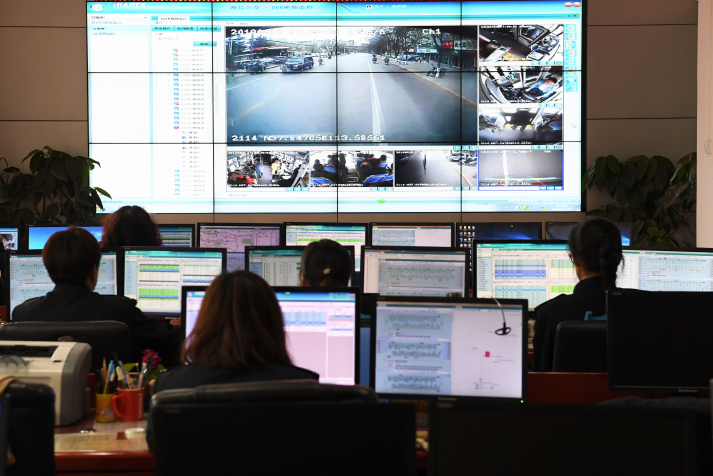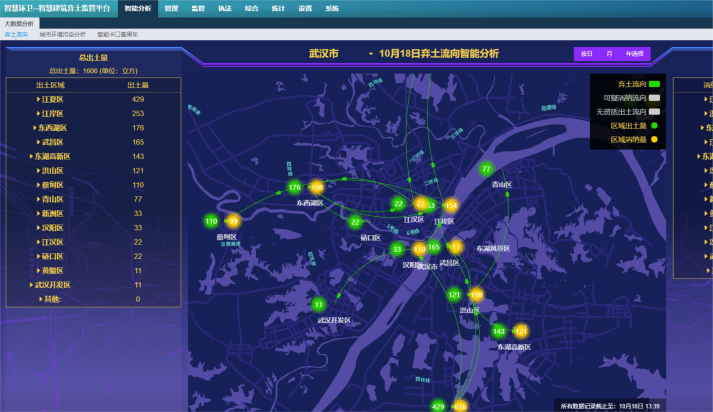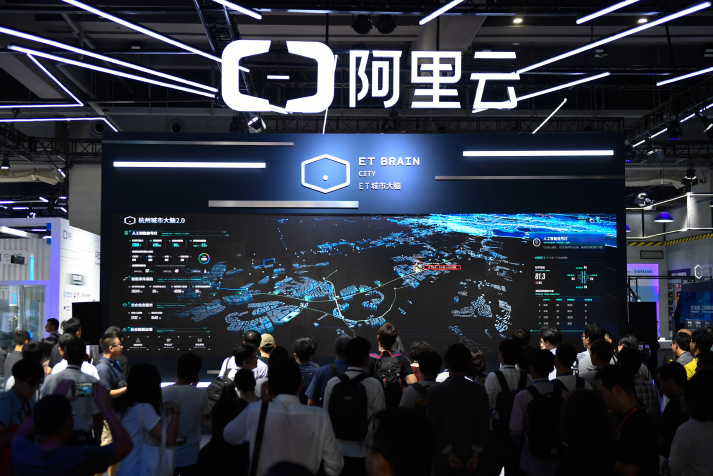|
||||||
|
||||||
| Home Nation World Business Opinion Lifestyle China Focus ChinAfrica Video Multimedia Columnists Documents Special Reports |
|
||||||
|
||||||
| Home Nation World Business Opinion Lifestyle China Focus ChinAfrica Video Multimedia Columnists Documents Special Reports |
| Nation |
| Free Flowing |
| Urban traffic management employs smart technologies for a smoother ride |
| By Li Xiaoyu · 2019-12-16 · Source: NO.51 DECEMBER 19, 2019 |
 Dispatchers monitor buses on a real-time control system at a public transit company in Yangquan, Shanxi Province in north China, on April 18 (XINHUA)
Ambulances in Hangzhou in Zhejiang Province, east China, can transport a patient to a hospital from any given point in the city in half the time required by authorities. How is this possible? Are the city's vehicles faster? Or are local ambulance drivers trained like race car drivers? Actually, the reason has everything to do with smart transport. At the end of 2016, the Hangzhou Municipal Government launched a project in collaboration with Alibaba Cloud, a subsidiary of Alibaba Group, to equip the city with an intelligent platform capable of processing data called City Brain. In case of emergencies, City Brain builds various algorithmic models before emergency vehicles are dispatched. It then designs the best route with the reference data (the speed and number of vehicles on road) provided by sensors. This solution goes beyond just requiring cars to give way to emergency vehicles; it focuses on the best use of road resources without disturbing the traffic flow. The efficiency of Hangzhou's ambulances is an example of applying new technologies, such as big data and artificial intelligence (AI), to problems of urban mobility.  A smart platform developed by Exsun Electronic Information Technology tracks the environment and sanitation situations in Wuhan, Hubei Province in central China, on October 18 (COURTESY PHOTO)
Streamlining optimization Urban mobility is a major issue for cities whose growth inevitably leads to more road congestion. Hangzhou fell from fifth in 2016 to 57th in 2018 on the ranking of the most congested cities in China, thanks in large part to City Brain, which plays an indispensable role in efforts to address traffic jams. "A city with a brain learns by itself," said Min Wanli, chief economist for AI at Alibaba Cloud, adding that City Brain's functioning is similar to that of the human brain. The difference is that the human brain processes information from senses such as sight and hearing, while City Brain processes data collected by surveillance cameras. The effectiveness of City Brain relies on billions of bits of data collected on urban transport. "Viewing all these videos would require some 150,000 police officers to work 24/7. But City Brain can do it in a short time," said Min. City Brain creates its model in a virtual digital city and offers smart solutions through machine learning. It guides drivers to choose at which intersections to turn left or right, and adapt to the frequency and routes of buses and other public transport. "It saves us from relying solely on the human experience, which is often unreliable and fragmented in urban management," Min added. An example of City Brain in action is the AI-controlled traffic lights at Hangzhou's expressway entrances. Using sensors, City Brain can detect traffic conditions and control the traffic lights. With self-assessment and self-regulation carried out every two minutes, the system tries to find the optimal solution to smoothing out the traffic flow. Today, it controls 50 percent of the traffic lights at expressway entrances. The fluidity of traffic has increased by 15.3 percent and the speed of traffic flow can remain up to 50 km per hour.  An exhibition of the City Brain municipal management platform jointly launched by the government of Hangzhou in Zhejiang Province, east China, and Alibaba Group during the Computing Conference of Alibaba Cloud on September 19, 2018 (COURTESY PHOTO)
Rational management Along with congestion, violations of traffic regulations are also a priority for traffic police. Overloaded gravel trucks, for example, are often criticized by the public for causing fatal accidents. As early as 2016, Wuhan, capital of Hubei Province, central China, developed the first gravel truck monitoring system in the country. Using technologies like the Internet of Things and big data, it can easily determine where trucks are on the road and where they are supposed to stop and unload their gravel. Behind this process is Exsun Electronic Information Technology, a Wuhan-based satellite positioning system developer. Its Chairman Fu Cheng told Beijing Review that the system's intelligence is based on the three sensors installed on each monitored truck, which can check if the vehicle exceeds the height and weight limit and if it is well sealed. At the other end of the system, a cloud server receives the data every 10 seconds sent by the sensors that monitor the truck throughout its journey. Thanks to the data collected, police can easily detect offenders from their office without having to stop them on the street. For example, if a truck has not yet arrived at a designated location and its weight is suddenly lower, it is easy to conclude that the driver has dropped off part of his load illegally. If so, the data can be used as evidence to punish offenders. According to statistics published by the Wuhan Traffic Management Bureau, since the launch of this system, no deaths related to gravel trucks have been recorded. "The development of urban infrastructure is limited and we may not always be able to build wider roads. But the use of new technologies can enable us to make the most of existing resources and provide innovative solutions to the problems facing us," said Min. Copyedited by Rebeca Toledo Comments to yanwei@bjreview.com |
About Us | Contact Us | Advertise with Us | Subscribe
|
||
| Copyright Beijing Review All rights reserved 京ICP备08005356号 京公网安备110102005860号 |